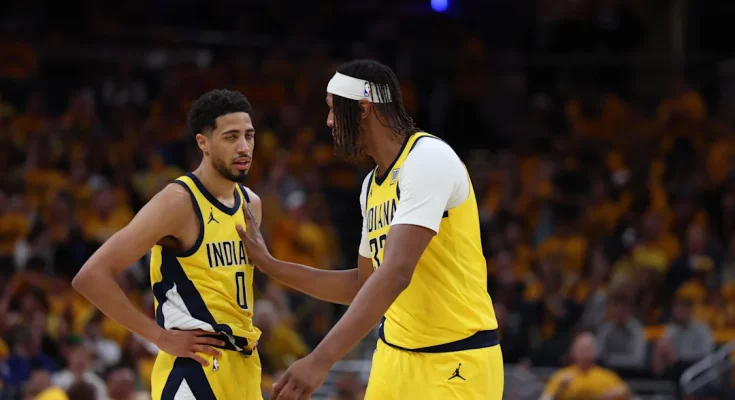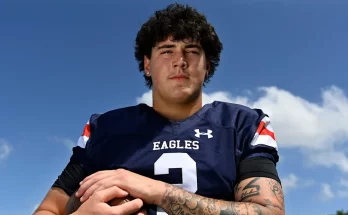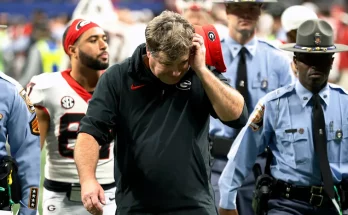In a candid revelation that has sent ripples throughout the NBA, Indiana Pacers star Tyrese Haliburton recently admitted that he wished former teammate Myles Turner had not joined the Milwaukee Bucks, one of the Pacers’ chief rivals in the Eastern Conference. This admission sheds light not only on the personal bond that Haliburton shared with Turner during their time in Indiana but also highlights the competitive realities of professional basketball, where player movement can dramatically alter team dynamics and rivalries. The NBA has increasingly seen stars shift teams through trades, free agency, or sign-and-trade arrangements, and Haliburton’s remarks are a stark reminder of how these moves resonate on a personal level for the players themselves, beyond the tactical or financial considerations.
Haliburton, who has rapidly emerged as one of the premier young point guards in the league, has been praised for his court vision, basketball IQ, and ability to make teammates around him better. His growth in Indiana has coincided with Turner’s development into a defensive stalwart and offensive contributor, particularly known for his shot-blocking, three-point shooting, and ability to stretch the floor as a modern big man. Together, they represented a cornerstone around which the Pacers could have built a competitive team in the Eastern Conference, and their synergy on and off the court was evident. Haliburton’s candid acknowledgment of wishing Turner had stayed is thus both a testament to the professional respect he has for Turner’s abilities and a personal reflection on what could have been for the Pacers.
The decision for Turner to join the Bucks has to be seen in the context of Milwaukee’s aspirations and roster needs. The Bucks, led by two-time MVP Giannis Antetokounmpo, have consistently positioned themselves as championship contenders, leveraging strategic acquisitions to complement their star duo of Giannis and Jrue Holiday. Turner’s skill set, particularly his ability to protect the rim and stretch the floor, fits seamlessly into the Bucks’ system, which relies on versatility and defensive intensity. From a player’s perspective, the move likely presented Turner with an opportunity to compete at the highest level for a championship, while also potentially securing favorable financial terms and long-term stability. Nevertheless, for Haliburton, watching a former teammate move to a direct competitor is an emotionally charged experience, blending personal disappointment with professional rivalry.
Haliburton’s admission also offers a window into the psychological dynamics that influence players in professional sports. While fans often focus on statistical production and team outcomes, the human element—friendships, mentorships, and locker room camaraderie—plays an equally significant role. Teammates like Haliburton and Turner spend countless hours together during practices, road trips, and team events, developing a rapport that can translate into seamless on-court chemistry. Losing such a teammate to a rival can feel like a personal blow, not just a tactical adjustment. In interviews, Haliburton has consistently demonstrated self-awareness and emotional intelligence, and his willingness to openly discuss these feelings underscores his maturity and dedication to authenticity, both on and off the court.
The implications of Turner joining the Bucks extend beyond individual sentiment. For the Pacers, the loss of Turner necessitates a strategic recalibration. Turner’s departure leaves a void in the team’s frontcourt defense and floor spacing, and it challenges the coaching staff to identify both short-term solutions and long-term roster strategies. Indiana will need to consider whether to develop existing players, pursue trades, or explore free agency to replace Turner’s unique combination of size, skill, and defensive presence. Haliburton, as the franchise’s cornerstone, may also see his leadership role amplified, tasked not only with guiding on-court performance but also with helping teammates adjust to a new roster configuration. This transitional phase can define the Pacers’ competitive trajectory for the upcoming seasons and will test the resilience and adaptability of both the players and coaching staff.
For the Bucks, adding Turner represents a strategic coup. Milwaukee has demonstrated an ability to integrate new players into its system efficiently, often leveraging advanced analytics and positional versatility to maximize talent usage. Turner’s ability to protect the rim, switch defensively, and stretch defenses with his shooting aligns with Milwaukee’s vision of maintaining a championship-contending roster while also preparing for the future. With Haliburton publicly acknowledging the impact of Turner’s departure, it is clear that the narrative surrounding these two players resonates beyond just the immediate teams, feeding into broader discussions about competitive balance, player movement, and the emotional dimensions of professional sports.
Moreover, Haliburton’s remarks may influence fan perception and media narratives. Fans of the Pacers, already grappling with the loss of Turner, may see his comments as validation of their own sense of disappointment. Conversely, Bucks fans may interpret the acknowledgment as a sign of respect for Milwaukee’s strategic acumen in acquiring Turner. The intersection of player sentiment, team strategy, and fan engagement highlights the multi-dimensional nature of modern professional sports, where decisions are scrutinized not only for their on-court impact but also for the stories they generate and the relationships they affect.
Beyond the immediate context, Haliburton’s transparency invites reflection on the evolving culture of player communication in the NBA. Historically, athletes were often reticent to express personal feelings about teammates’ movements, preferring to maintain a neutral or publicly strategic stance. In recent years, however, social media, player podcasts, and candid interviews have cultivated an environment where authenticity is increasingly valued. By expressing his honest feelings, Haliburton contributes to this shift, demonstrating that professional competitiveness and personal sentiment can coexist. His comments may also set a precedent for other players, encouraging open dialogue about how trades and free agency decisions impact relationships and team chemistry.
Another dimension worth considering is how this dynamic may affect Haliburton and Turner when they inevitably meet on the court. Rivalries in the NBA are often intensified by personal histories, and knowing that a former teammate possesses both the skill to challenge and the personal connection to respect can add layers of psychological nuance to games. Haliburton may approach matchups against the Bucks with heightened focus, leveraging familiarity with Turner’s tendencies while also contending with the knowledge that Turner knows his style of play as well. Such scenarios can produce compelling storylines and elevate the intensity of contests, ultimately benefiting the league in terms of viewership and fan engagement.
From a broader perspective, Haliburton’s comments underscore the human side of professional basketball, where career decisions intersect with personal loyalties and ambitions. Turner’s move, while strategically sound for both player and team, cannot erase the personal bonds forged during their shared time in Indiana. For Haliburton, articulating this sentiment publicly demonstrates courage and authenticity, qualities that resonate with fans who increasingly value players’ honesty and relatability. At the same time, it signals to teammates and the broader NBA community that even in a fiercely competitive environment, professional athletes remain deeply connected to one another on a human level.
Looking ahead, the next chapter for both players will be closely watched. Haliburton’s continued development as a leader and playmaker for the Pacers will be critical as the team navigates the post-Turner landscape, while Turner’s integration into the Bucks’ system will be scrutinized for its impact on Milwaukee’s championship aspirations. Both players are at pivotal points in their careers, with the potential to shape narratives not only through their individual performance but also through how they manage relationships, rivalries, and public perception. Haliburton’s openness may even serve as a bridge for dialogue between the two teams, fostering mutual respect while intensifying the competitive stakes.
In conclusion, Tyrese Haliburton’s admission that he wished Myles Turner had not joined the Milwaukee Bucks is more than a simple expression of disappointment. It encapsulates the intricate interplay of personal relationships, professional strategy, and emotional intelligence in modern professional basketball. It highlights the challenges teams face when key players depart, the opportunities such moves create for rivals, and the psychological dimensions that shape how athletes approach competition. Haliburton’s candidness enriches the broader NBA narrative, offering fans and analysts alike a rare glimpse into the human side of the sport. As the new season unfolds, the legacy of this decision—both on the court and in the hearts of players—will continue to unfold, providing a compelling storyline that reminds us that behind every trade, every free-agent signing, and every roster move, there are real people navigating a complex web of ambition, loyalty, and friendship. Haliburton’s honesty ensures that this story will not be forgotten, and it underscores the enduring impact of the bonds formed in the high-pressure world of professional basketball.



